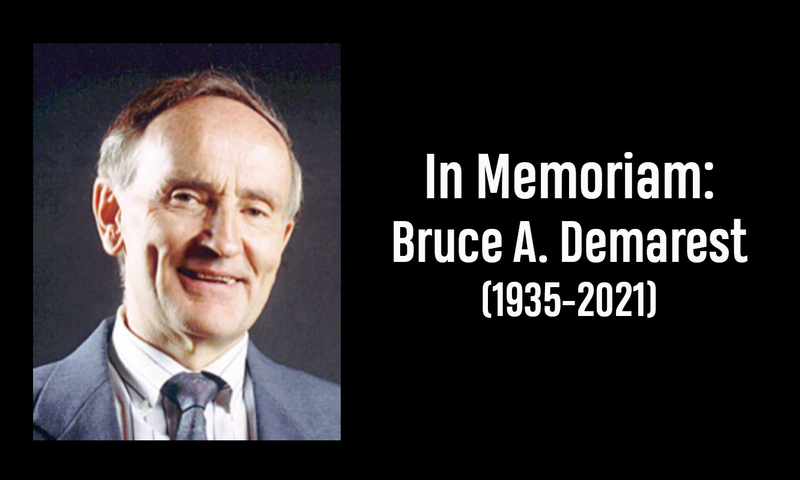It seems especially important in these days to draw attention to a life lived well. Dr. Bruce Demarest, Senior Professor of Christian Theology and Spiritual Formation at Denver Seminary, led such a life.
My first exposure to Bruce was via his three-volume systematic theology, Integrative Theology, co-authored with his colleague Gordon Lewis.[1] As a young philosophical theologian, I loved the sound of an integrative systematic theology. I imagined a theology-as-queen-of-the-sciences type venture: philosophy, the sciences, and historical theology dialectically engaged with biblical exegesis. But after assigning the book for a theology class and receiving my desk copy, I realized that what Demarest and Lewis meant by ‘integrative’ was not quite what I had imagined. Their book had substance and was unique in its approach, but I found it more applied than truly integrative. I remember some of my students commenting that the book seemed a bit dry and stuffy. I suggested a reframe of “logically rigorous” and “rhetorically sharp.” Another student in the class reported having previously had Dr. Demarest as a theology professor and this student’s experience was that Demarest himself was a bit dry, stuffy, rigorous and sharp!
But by the time I met Bruce some years later, he was anything but dry and stuffy. He was quite warm, gentle and capacious. There was a twinkle in his eye that made me wonder if he “had been with Jesus” (Acts 4:13). As it turns out, he had. He told me his conversion story as we sat for breakfast in a hotel restaurant. Not his initial conversion, but his second one. He said, “Steve, I was burning out. I was past president of the Evangelical Theological Society, a tenured professor, well-published, and I was thinking about walking away from it all.” In that season of dryness, Bruce’s wife Elsie encouraged him to attend a series of classes at their church led by a Christian renewal team. While Bruce was reluctant to go, he at last relented and, as Bruce puts it, “it was to begin a quiet but utter transformation.”[2] Bruce describes it this way:
The grace of God was something I’d experienced at the moment of salvation and relied on for my future with God in heaven. For now, though, God’s continual outpouring of grace was fairly abstract to me. I’d been “saved” and that was that. Now it was up to me to work hard as a Christian, to succeed in higher education, and to prove myself to the watching world….I tended to view the Christian faith largely in terms of rational propositions, so I loaded (and probably overloaded) my mind with intellectual analysis. True, I could wax eloquent about the mysteries of the Trinity or theories about the Atonement, but I didn’t relate that well to God on an everyday, affective level….What was coming to life, or to light at any rate, was the inner man in Christ—the roots of my personality and the new character God wanted to form in me. I found that I’d let God have my mind and even my physical person for His service. The question was, Would I, after years as a Christian, give Him the depths of my heart?...The ministry of this renewal team in our church proved to be God’s Kairos—a defining, redemptive moment in my life. Despite my initial resistance, I was beginning to experience more life from within than I’d ever known.[3]
Others who knew Bruce “before and after” have testified to the change. One colleague, Marshall Shelley, recounts, “Bruce’s transformation from a rationalist to one who eventually recognized, in Pascal’s words, ‘The heart has its reasons, which reason does not know…We know truth, not only by reason, but also by the heart.’ That development over the years was a wonder to behold….”[4]
As editor of the Journal of Spiritual Formation and Soul Care, I was extremely grateful for Bruce’s service on our editorial board. In his last published contribution to the journal, Bruce offered an essay that described his personal rule of life: daily practices of remembering God’s faithfulness, recollecting one’s self before God in prayer, reflecting on one’s true self in Christ, and reminding one’s self of God’s work through spiritual journaling.[5] Harkening back to the shift from his “rationalist” days, Bruce writes, “In his goodness God has impressed upon my heart in recent years the need to devote focused seasons to remembering, recollecting, and reflecting on my life in relation to God and others, with much spiritual profit. Would that I had cultivated this practice earlier in my life and career.”[6] Bruce ended his essay by quoting the fourth stanza of Robert Robinson’s hymn, “Come Thou Fount of Every Blessing”:
Prone to wander, Lord I feel it,
Prone to leave the God I love.
Here’s my heart,
O take and seal it,
Seal it for thy courts above.[7]
With these words of Robinson’s hymn, Bruce answers his earlier proposed question: “Would I, after years as a Christian, give Him the depths of my heart?”[8] By all appearances the answer was a resounding yes. “Here’s my heart, O take and seal it, Seal it for thy courts above.”
Thank you, Bruce, for all you have done—all the Lord has done through you. Thank you for allowing Jesus to enter the depths of your heart. We will miss you.
Notes
- Gordon R. Lewis and Bruce A. Demarest, Integrative Theology (Grand Rapids, MI: Zondervan, 1996).
- Bruce Demarest, Satisfy Your Soul: Restoring the Heart of Christian Spirituality (Colorado Springs, CO: NavPress, 1999), 24.
- Ibid., 25, 28.
- Denver Seminary, “In Memory of Dr. Bruce Demarest,” accessed February 12, 2021, https://denverseminary.edu/in-....
- Bruce Demarest, “Remembrance, Recollection, and Other Rs,” Journal of Spiritual Formation and Soul Care 10:1 (2017), 4–11.
- Ibid., 10.
- Ibid., 11.
- Satisfy Your Soul, 28.
 Biola University
Biola University




